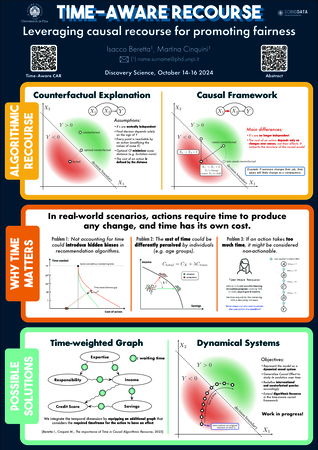Causal Inference over Time
Algorithmic Recourse (AR) addresses adverse outcomes in automated decision-making by offering actionable recommendations. However, current state-of-the-art methods overlook the interdependence of features and do not consider the temporal dimension. To fill this gap, TimeCar emerges as a pioneering approach that integrates temporal information. Building upon this formulation, this work investigates the context of fairness, specifically focusing on the implications for marginalized demographic groups. Since long wait times can significantly impact communities’ financial, educational, and personal lives, exploring how time-related factors affect the fair treatment of these groups is crucial to suggest potential solutions to reduce the negative effects on minority populations. Our findings set the stage for more equitable AR techniques sensitive to individual needs, ultimately fostering fairer suggestions.
